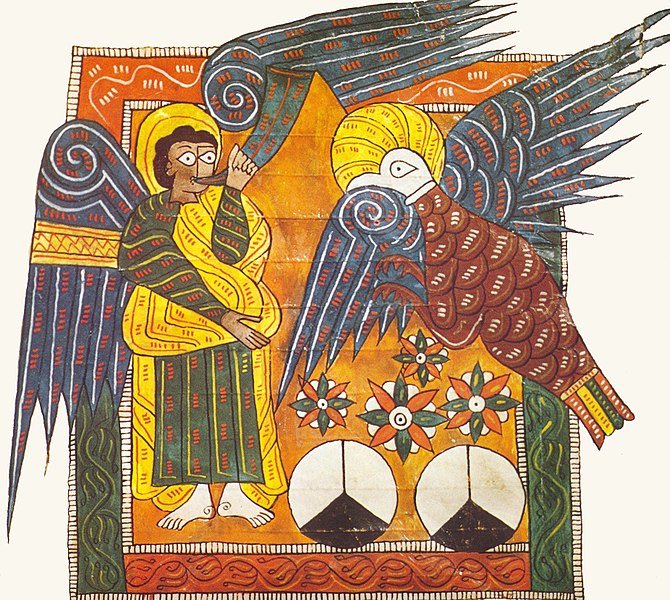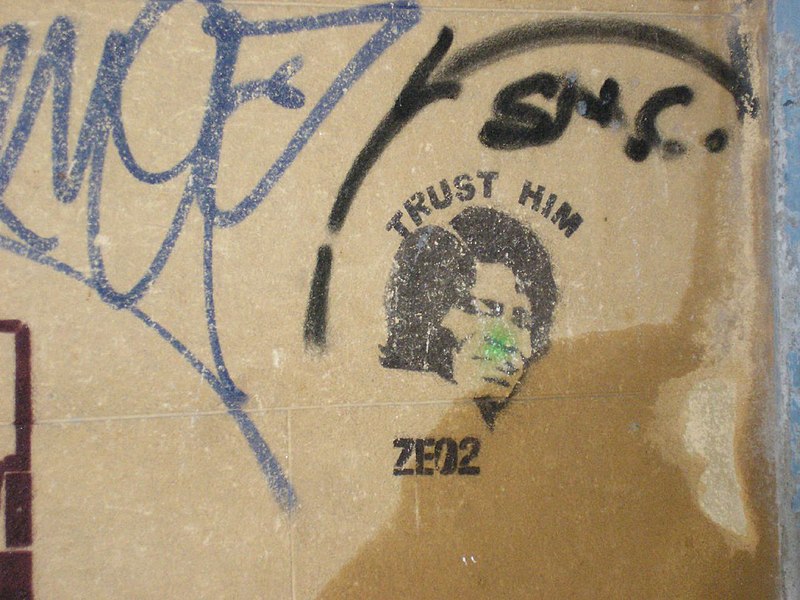.
If
you play
James
Brown’s
“Money
Won’t
Change
You”
in a
bank
the total
environment
is changed.
*
The only
people
who will
escape
will be
those
who have
the
seal
of God
on their
foreheads.

James Brown stencil art, Por el Rastro, Madrid: photo by Brocco Lee, 2006
Le quatrième Ange sonne de la trompette (Apocalypse VIII), c.950-955 (ms. from El Escorial, Real Biblioteca de San Lorenzo, Madrid)
Le quatrième Ange sonne de la trompette (Apocalypse VIII), c.950-955 (ms. from El Escorial, Real Biblioteca de San Lorenzo, Madrid)

Can we just paste this to our foreheads?
ReplyDeletehttp://www.socialearth.org/wp-content/uploads/2009/11/InGodWeTrust.jpg
Otto's useful suggestion:
ReplyDeleteThe seal of God.
nwo. represent.
ReplyDelete"I feel good" James said as the
ReplyDeleteastronaughts played his song in
space.
When there was rioting in Boston
James got on TV and told people
of good will and how he started
by shining shoes in front of a
radio station....that finally he
owned.
I believe James was quite smart
but his mind wasn't as wild as
his rhythms which he believed
in the most
As for money honey
He made it, he liked it.
And I believe one of TC's heroes
coined the phrase in the face of
art "Get the money"
Hahah .. that is an interesting proposition Tom.
ReplyDeleteWhy did they invent money in the first place?? It was necessary . . ??
Anonymous (Elmo the Saint),
ReplyDeleteYes, and it changed them.
(Nobody's that acquisitive to start with.)
Aditya,
What and why is money?
Best quick summary I can think of is that compressed in the title of J. Buchan's terrific work on the subject: Frozen Desire.
I'll try it. It is hard to get books in here !!!
ReplyDeleteLove this, Tom!
ReplyDelete"What happened to the old bank, it was beautiful?"
"It kept getting robbed."
"That's a small price to pay for beauty."
(from Butch Cassidy and the Sundance Kid, in case you'd forgotten.)
I think money only became necessary when people started travelling on their own and trading across distances. You can use barter in a village, or between members of a nomadic tribe, but once you move yourself or your goods around and have to deal with people who don't know you, swapping items or services becomes more and more difficult and it becomes useful to have a token of value to exchange.... But how did it come to take us over?
Zeph,
ReplyDeleteYes, that is the question. A trap human beings built, only to catch themselves in it.
Your comment has prompted me to return to James Buchan's Frozen Desire (1997), a profound and eloquent book that gets stronger with the passing of the years. It is at once a history of money and a lament for the devastation it has brought upon its creators.
Let me quote a bit:
"We have learned that money, far from existing for all eternity like Melchizedek in the Bible, has a history. For from obscure beginnings, money has spread out to colonise the world, both in its forms as coin or banknote or book entry and as a notion of happiness penetrating the minds of men and women...
"Money is one of those creations that make concrete a sensation, in this case the sensation of wanting, as a clock does the sensation of passing time. It is that double aspect of money, airy and substantial, that has fascinated all civilisations. Human beings have never quite been able to decide whether money is a universal come down to earth or a daily thing for ever aspiring to perfection. It seems to have a wandering or frontier reality, like a ghost or a sailor who, to the ancient Greeks, seemed not wholly of the living or of the dead...
"The relations of human beings, both to one another and to the world of things, took on some of the character of money. They became fluid, temporary, indifferent, unstable. Reality, which men and women had been at first content to name and then to legislate, was priced...
"... the desire incarnate in money offered a reward to the imagination, as between two lovers; and that reward seemed at first to be guaranteed by rare and beautiful metals, of whose inner nature and capacity men could only dream. In time, that guarantee was unveiled as only the projected authority of a community... It was the community that authorised the wishes expressed in money or frustrated them. To use money was to submit to the state, and when states disintegrated their moneys vanished as completely as their laws...
"For the world... is a battlefield of wishes, which are limitless and cannot be satisfied except for a moment. Money expresses man's permanent dissatisfaction, which is the spring of his activity, his achievements, and his profound unhappiness. Like desire itself, money is destroyed only to be reborn, like the lovely nymph in Forough Farrokhzad's last poem:
Dying each night with a kiss
To come alive with a kiss in the morning
"...We cannot detach a portion of our nature and worship it, without diminishing the human being that remains, and it is the entire human being, not merely its self-regarding wishes, that must be thrown into battle as the shades of darkness come down...
"Money, far from being the harmless arena of human emulation as its apologists hold, is a great destroyer..."
Brilliant... and depressing...
ReplyDelete